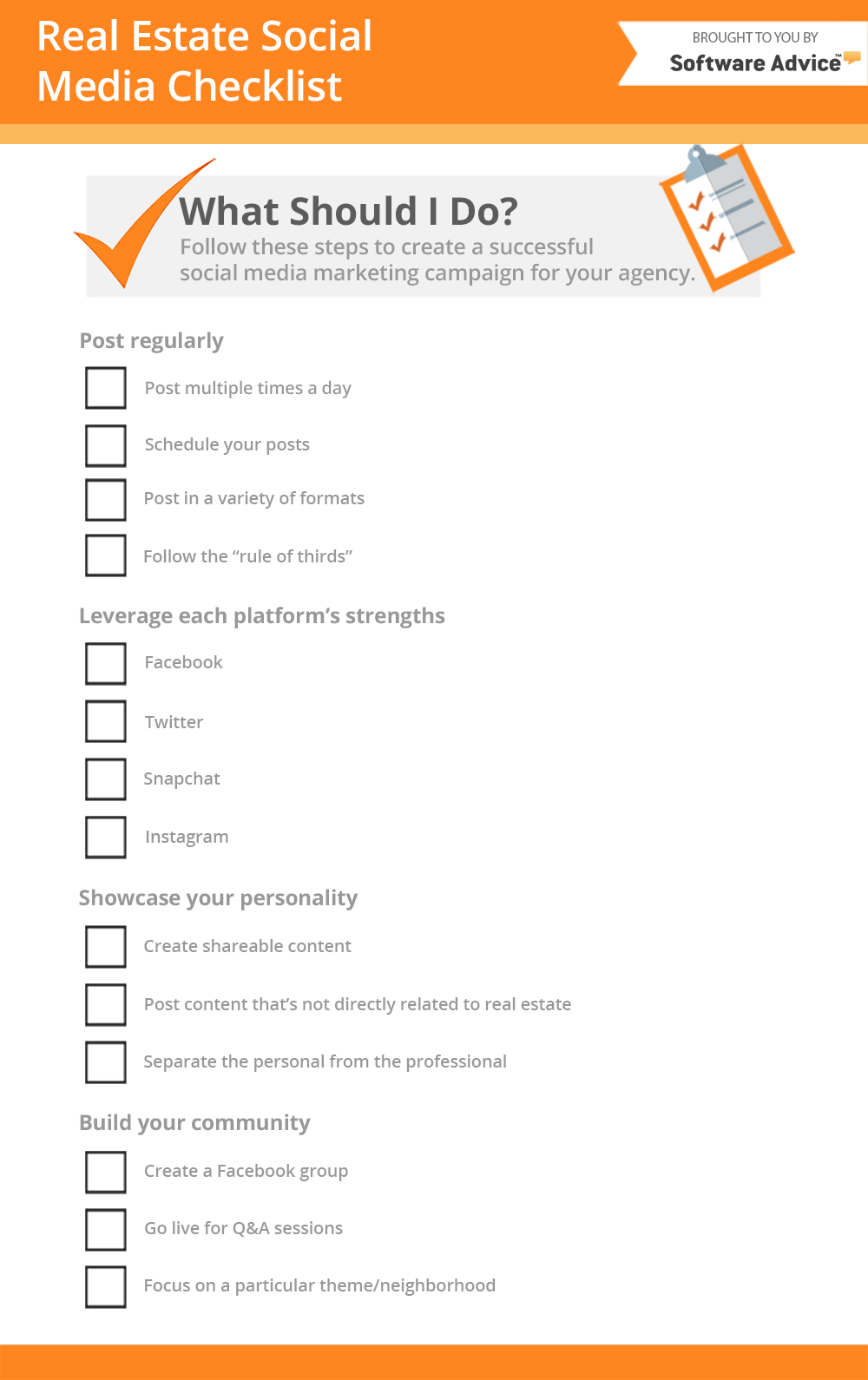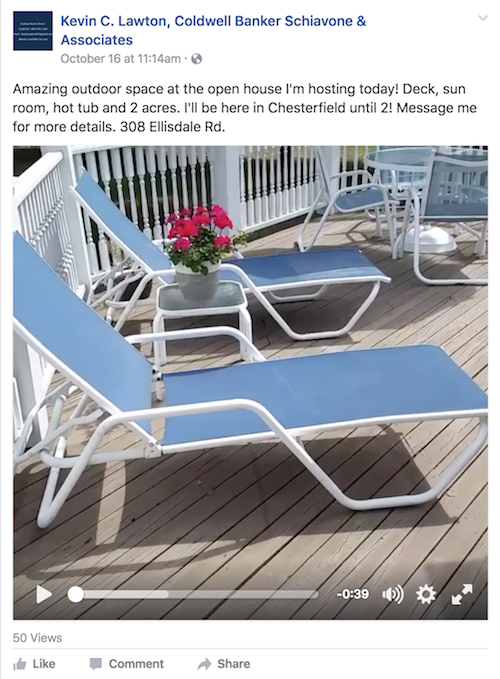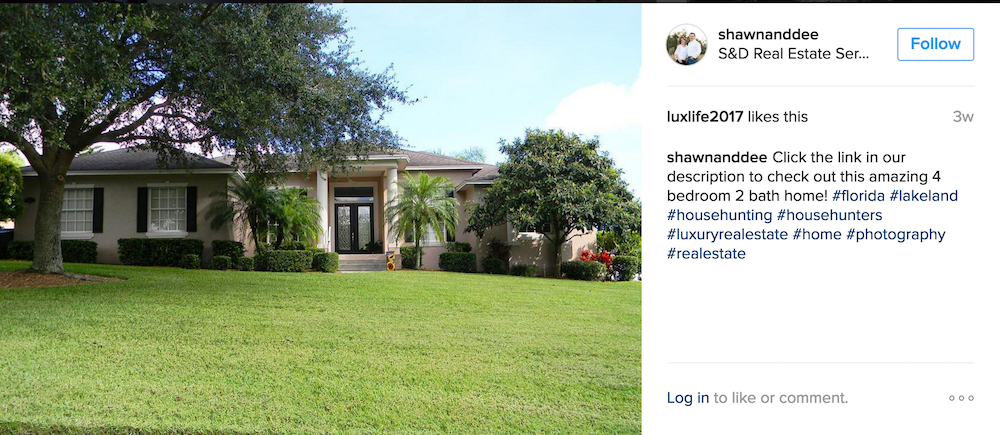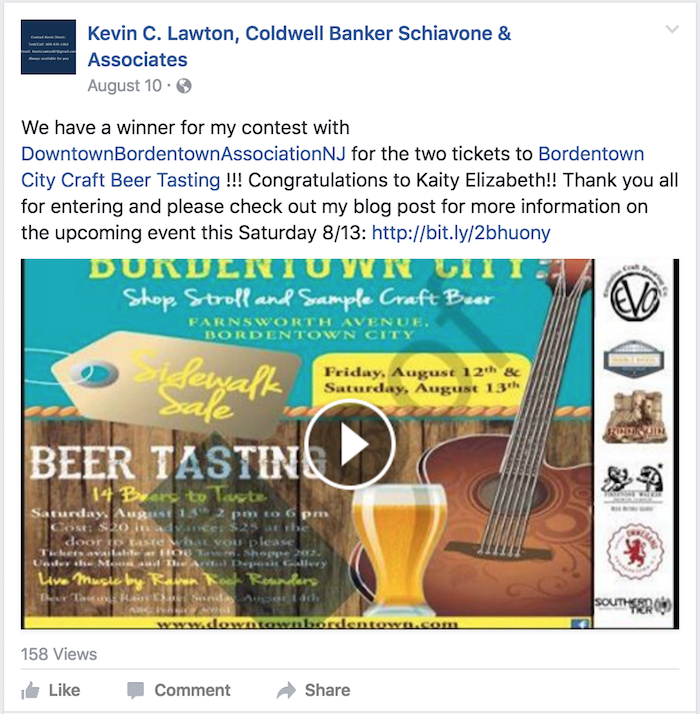Your Real Estate Social Media Marketing Checklist
Social media marketing is one of the cheapest and easiest ways for real estate agents to advertise their services and properties. And, realtors working for small and midsize agencies may actually have an advantage in this area. For them, real estate social media marketing is an important tool that can help build up their business.
The Gartner Hype Cycle for Digital Marketing and Advertising, 2016, by analysts Mike McGuire and Andrew Frank (available to Gartner clients), notes that for large, enterprise-level businesses, “many marketers struggle to establish and effectively communicate the business value being created from their social marketing efforts.”
For this reason, Gartner places social marketing in the “Trough of Disillusionment” portion of the Hype Cycle for big businesses.
Your small agency can use this disillusionment to your advantage. You’ll be able to directly see the return on investment (ROI) for your social media strategies and campaigns, and you can quickly adjust those campaigns to achieve the best results.
However, there are ways to go about social media marketing for real estate that are proven to succeed, and others that are not as effective.
Here are the approaches we’ll cover:
Leverage Each Platform’s Strengths

We talked to several realtors and marketers to find out what works for them, and distilled their advice into this handy checklist, which we’ll review in detail.

Post Regularly
The best way to find success through social media marketing is to build up a following on a variety of platforms. The best way to do that is by posting regularly.
You need to post frequently enough that your followers are aware of your presence, creating brand recognition for yourself. This means posting multiple times a day.
However, you don’t want to post too often, flooding your follower’s feed to the point that they decide to unfriend or unfollow you.
Carefully schedule when you will make your posts, and what type of content you will post during the course of each day.
Kelly Jacobson, junior content creator at marketing and PR firm Illumine8, notes that real estate is the most saturated market on social media.
As a result, “it’s important to put quality content over the quantity of it, and time posts well. Use analytics on Twitter and Facebook to see when your followers are most active, then schedule quality posts at that time.”
You don’t want to just post the same types of content over and over again, or your followers will get bored and start to ignore it. Instead, make sure you’re mixing it up with different content including:
Promotional posts
Personal posts
Editorial posts
Shared content
Jacobson advises that, “it’s best to mix sales-driven and evergreen content,” such as “how-to” blog posts and your agency’s contact information.
Carolyn Brundage, the co-founder of social media marketing company Oak St. Social, recommends the rule of thirds: “one-third of your content should be promotional, one-third should be editorial style original posts and one-third should be great content that you’re sharing from someone else.”
Leverage Each Platform’s Strengths
The best content will take advantage of the social media platform that you post it to. Here are what the experts consider to be the advantages of each of the leading social media sites:
Facebook remains the top social media platform, but most people use it to connect with friends and family rather than to seek out content.
Thus, your own posts need to be unique and to-the-point. If you post listings on Facebook, for example, you want the post to be as brief as possible, directing customers to your own landing page for the full details.
Ryan Ruud, digital marketing consultant and founder and CEO of digital marketing firm Lake One, recommends utilizing the new, immersive 360-degree photo option provided by Facebook: “This feature lets prospects feel like they’re in a room and taking a virtual open house tour.”
For an even more immediate, direct experience, you can use the Facebook Live feature to provide interactive tours of properties or to host Q&A sessions (which we’ll talk about in more detail later).
Facebook also provides you with the most advertising options of the major social media platforms. Its Carousel Ads let you showcase multiple images, and its fine-tuned user metrics enable you to target your paid content very specifically.

A Facebook post from Kevin C. Lawton
Kevin C. Lawton, a realtor at Coldwell Banker Schiavone & Associates, explains that on Facebook you can “target the people you want with paid advertising. You are cutting out people that would just be a waste of time because they are not looking to transact or are unable to transact.”
Facebook ads are generally inexpensive, with an expansive reach for maximum exposure.
Like Facebook, Twitter has millions of users across various age groups, and is thus a good place to get a large number of eyes on your posts and content.
Because of Twitter’s inherent limitation—each individual Tweet can only be 140 characters in length—it is not the place for long-form content (unless you’re just linking to that content).
Rather, you should use Twitter to maintain a presence with your followers and enable them to publicly and directly ask you questions that you can answer for the benefit of all of those followers.
Emily Mort, graphic designer and marketing specialist at S&D Real Estate Services, warns that, “Twitter is not that place for you to post your new listing, it is the place to answer questions, talk to people, share tips and more.”
New website launching this Friday. "So easy a Guinea Pig can do it". Renting made easy with RentSpree! pic.twitter.com/Kl49GKlw8z
— RentSpree (@rent_spree) August 18, 2016
A creative promotional use of Twitter by RentSpree
It’s best to think of Twitter as an ongoing conversation with your followers and customers, rather than as a publishing platform. It’s a great place for you to develop your online personality and presence, an important topic that we will return to later.
Snapchat
Our experts are somewhat divided on whether or not it’s worth your time and energy to invest in a Snapchat presence. Some think that any social media network can be leveraged to create leads, while others think you need to stop and take a look at the platform’s user data.
For example, Annie Ives, CEO of listing service The MLS™/CLAW, notes that “60 percent of Snapchat users are under 25, and the average age of homeowners is 55 years old.”
However, Snapchat shares many of the advantages of Facebook Live, enabling you to create quick, immediate, immersive video content.
For example, Ryan Ruud suggests that the best way to connect to potential clients on Snapchat is to “take them on short video walkthroughs. In real estate, it’s critical to create emotional connections and connect people to properties through media.”
Keep in mind who your customers are, though. If you sell small, fixer-uppers to young, first-time buyers, then Snapchat will likely be more successful for you than if you cater to an older, wealthier demographic.
Instagram is all about pictures, which makes it an ideal space to post the most gorgeous, professional pictures you have of your properties, promoting the highlights. Instagram is particularly suited for industries like real estate that are reliant upon images to build leads.
As Emily Mort explains, “this is where you would showcase a room of a house, or the front or back view of a house, sharing home decorating ideas, even little behind the scenes shots.”

An Instagram post from S&D Real Estate Services
In addition, as with Facebook, on Instagram you can create targeted paid advertisements that will be seen by your specified demographic rather than blanketing a larger, and largely disinterested, audience.
Showcase Your Personality
No matter what platform you’re using, remember that being a successful realtor relies upon personality and salesmanship. Showcase those traits in your posts, and create a persona that your followers trust and enjoy.
Michael Lucarelli, realtor and founder of Los Angeles real estate website RentSpree, recommends that you post shareable content first and foremost, in order to gain a follower base: “Post funny pictures and videos not necessarily related to real estate. Build a following of people who are interested to see your posts by posting interesting things.”
“That way,” Lucarelli continues, “when you want to market a property, you have a built-in base of viewers. You’ll never get the following you want if you just promote listings all the time.”
However, you want to stay within certain limits. Posting pictures of baby animals is one thing; posting political memes is another. Stay funny, cute and non-offensive so you don’t drive any potential clients away.
Along the same lines, make sure that you establish a professional Facebook page (as well as Twitter/Snapchat/Instagram accounts) that are separate from your personal one.
Emily Mort advises using this page to post virtual tours, place listings, advertise open houses, share real estate tips and conduct other professional activity that isn’t competing for visibility with your personal postings.
Creating these unique professional pages on various social media networks is the first step toward building an online community around your agency that will help you increase your business.
Build Your Community
Use your social media presence to position yourself as a community leader amongst the demographic that you cater to.
Using your professional Facebook page, for example, you can establish a neighborhood Facebook group. Leslie McDermid, founder of Social Media Marketing Tips Canada, recommends that realtors use such groups to offer their expertise, “and grow a community of people who truly want to work with them and recommend them.”
McDermid says, the group can share content such as “property tax information, news about the area, events, Facebook Live broadcasts, tips and could feature businesses in the area and even interview local residents about why they love the area, and why businesses love doing business in the area.”
You can build the same type of community around your professional Facebook page, as well. Take advantage of Facebook Live to host weekly events such as property tours or Q&A sessions.
In those sessions you can take live questions from your followers and answer them via video feed. This is an opportunity for followers to get to know you better and become comfortable with you as a realtor.

How Kevin C. Lawton builds community on Facebook
Furthermore, as Jannina Spates Warren, marketing and social media consultant at The Savvy Circle LLC explains, “This will help you build relationships and establish you as an expert. This also creates relevant content that you can share across social networks, via email and on personal websites.”
However, before you start to build a community around your services, you need to decide specifically what that community actually is.
Carolyn Brundage explains, “If you are going to position yourself as the neighborhood expert, for example, [make sure] that your fans will engage and enjoy content that focuses on neighborhood hot spots and events in the area.”
Focus your content around a particular theme—the type of listings you post most often, the neighborhood in which most of your listings are located, real estate tips for a particular income bracket etc. This way you can build a following of people who are most likely to use the services you provide, and build your business.
Next Steps
Here are some next steps to think about as you plan your social media strategy:
Set up your professional accounts on Facebook, Twitter, Instagram and Snapchat. Play around a bit and see what type of content works best for you!
Read user reviews of the top real estate CRM and contact management software for further insight into systems that you may find helpful for your agency.
Email me at andrewfriedenthal@softwareadvice.com for more information. I’m happy to help you figure out what your own marketing or real estate software needs might be and to connect you to one of our expert software advisors for a free, no-obligation consultation!